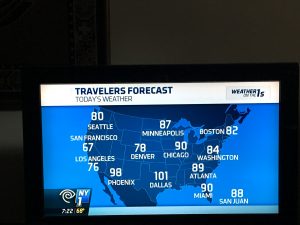My mother is ailing. She is 89 and, until early June, was living an independent life—reading as voraciously as ever on her Kindle, playing bridge, contemplating which shows she wanted to see in the new theater season, and looking forward to hearing stories about my travels. She even booked a fall foliage cruise up the eastern seaboard. That life came to a halt with a stroke on June 4 and now everything is different.
I was talking to my cousin, she’s a few years older than me and her late father was seven years older than my mom. We were having the kind of candid discussion of palliative care, hospice specialists, and grief that our generation is supposed to have. It’s not how death was spoken of by my grandmother, nor is it what I heard as a child. My cousin was practical, helpful, honest, and rational—and so was I. It wasn’t as if we were unemotional. We were very emotional, but we were also looking at a dire situation as a natural and normal part of life.
“It’s not like it is on TV,” she said, referring to the ‘death scenes’ in popular culture, top-loaded with revelations, reconciliations, and drama.
As a fiction writer, reader, and daughter of a life-long mystery fan, it’s strange to realize that the clichéd storylines, the last year of life, the way toward THE END is not THE END of stories. It’s quiet. It’s tired. It’s a painful letting go and not a big event.
Yes, life is not like TV.
Still, there is something wonderful about those pivotal scenes on TV, in movies and—most of all—in novels. The death scene literary tradition is powerful. We want to hear for whom the bell tolls; we want to know the secrets of a life well spent (or creatively misspent); we want to know big truths and even bigger lies, and fiction gives us real endings. Real life is not a great dramatist. Things roll along, stutter, slow, roll some more and then end. Talk about the past, talk about the future that would have been, and cope with the present situation. And try not to feel the lack of drama.






I’m so sorry, Candy. I admit I’m scared of getting, not old, but frail. I guess we’re both lucky that we can escape into our writing. -hugs-
This morning at the gym, I was thinking about your Innerscape character and her response to aging. I hope to read the next version of the novel soon. I loved her. She was so… individual in her reactions to everything.
I’m sorry to hear about your mother’s illness. I agree. It’s not like TV.
I’m not sure if the dramas on TV (and in movies and books) help or hurt our understanding of life. Heightening the emotional impact is great for fiction, but… real life has a way of doing BIGGER things in quieter ways. Should we write about that?